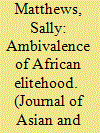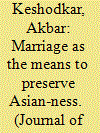|
|
|
Sort Order |
|
|
|
Items / Page
|
|
|
|
|
|
|
| Srl | Item |
| 1 |
ID:
096042


|
|
|
|
|
| Publication |
2010.
|
| Summary/Abstract |
Recent discussions in South Africa about the role of the so-called patriotic bourgeoisie highlight the much debated question of what role elite Africans can and ought to play in the upliftment of the poor. Those supporting the notion of a patriotic bourgeoisie believe that national or racial solidarity is sufficient to allow privileged Africans to act in the interests of their poorer fellow citizens. However, a reconsideration of an older discussion of African elitehood, that of Amilcar Cabral, suggests that something more may be needed before elites can act in the interests of the poor. Cabral argues that elites need to renounce their privilege and to live and struggle alongside the poor if pro-poor societal transformation is to be achieved. While Cabral may be right that shared racial or national identity is insufficient for elite solidarity with the poor, he does not consider all the complexities that arise when elites actually try to work with and for the poor. A consideration of the experiences of a long-standing Senegalese NGO reveal some of these complexities and suggest that any attempt by African elites to engage meaningfully in the upliftment of the poor, will inevitably involve continuous and difficult negotiation between paternalism and naïve egalitarianism.
|
|
|
|
|
|
|
|
|
|
|
|
|
|
|
|
| 2 |
ID:
096046


|
|
|
|
|
| Publication |
2010.
|
| Summary/Abstract |
The question of identity, shaped by issues of race and ethnicity, is paramount in the multi-cultural ethnic landscape of Zanzibar. This article examines how the present-day Asian community of Zanzibar, decimated by the 1964 Revolution, when an African insurgence overthrew the islands' Arab rule and expelled the majority of Arabs and Asians, survived in Zanzibar in the years following the Revolution and how, through demarcating communal boundaries and exercising specific marriage strategies, it has managed to maintain its distinct Asian identity. The article is based on anthropological fieldwork in Zanzibar.
|
|
|
|
|
|
|
|
|
|
|
|
|
|
|
|
| 3 |
ID:
096040


|
|
|
|
|
| Publication |
2010.
|
| Summary/Abstract |
This article offers a much-needed conceptual analysis of China's emerging international agency in Central Asia. In particular it engages with the apparent susceptibility of Central Asian states to China's normative power. The contention is that the emphasis on the dynamics of international socialization offers a relevant framework for evaluating Beijing's capacity to engage regional states. By relying on its normative power, China has gradually attracted Central Asia into its sphere of influence through the promotion of various initiatives for regional cooperation consolidated in the Shanghai Cooperation Organization. Such conceptualization of Beijing's conditioning propensity reflects upon China's international role(s) in the region.
|
|
|
|
|
|
|
|
|
|
|
|
|
|
|
|
| 4 |
ID:
096041


|
|
|
|
|
| Publication |
2010.
|
| Summary/Abstract |
A plethora of theoretical perspectives have explained India and Pakistan's nuclearization. Such arguments, while partially correct, offer little that incorporates how the constitutive nature of states' identities explain their perceptions of (in)securities and nuclear policy choices. In this article, I offer an interpretive analysis of India and Pakistan's nuclear trajectory by exploring the representations of (and the connections between) their nationalist identities, perceptions of insecurities and nuclear policy choices. Following the critical constructivist premise, I argue that while India and Pakistan have justified their nuclear policies on the basis of certain geo-strategic (in)securities, the interpretation of what constitutes their national selves and (in) securities have been driven by their historical legacies, economic or developmental anxieties, and their political leaders' (or states') ideologies. Seen from this critical constructivist perspective, I particularly draw attention to a conjectural moment of South Asian politics, where, following India's nuclear detonation under the BJP in May 1998, the nuclear (in)security discourses of India and Pakistan have drawn from cultural re-articulations of their nationalist identities and (in)securities to justify their nuclear policies. I conclude by suggesting the need to engage realism (i.e. the material realm) with critical constructivism (i.e. the interpretive realm) to comprehend cultural productions of identities and (in)securities in inter-state politics.
|
|
|
|
|
|
|
|
|
|
|
|
|
|
|
|
| 5 |
ID:
096044


|
|
|
|
|
| Publication |
2010.
|
| Summary/Abstract |
This article is an attempt to understand 'locality', where the issues of subversion, subordination and marginalization as well as the problematic notions of liminality and empowerment are more vibrant and real. We shall demonstrate that while the low castes and untouchables were engaged in economic conflict, at various levels, with the high-caste landowners, which resulted in occasional uprisings too, the popular belief system was used by the marginalized as an instrument of assertion of their power against social coercion. It is argued that the social and ritual protest aimed at diluting or subverting the local caste hierarchy in a stratified society is an efficacious threat to the power of the high castes; that the hope of social revision becomes an alternative to economic subordination. More important, the symbols of empowerment are not the ones controlled by the high castes, but those which are located in the specialized rituals of the marginalized dalits. This article is about these symbols, which are liminal in nature, and how they empower, if only for a brief while, the economically exploited and socially marginalized dalit practitioners.
|
|
|
|
|
|
|
|
|
|
|
|
|
|
|
|
| 6 |
ID:
096045


|
|
|
|
|
| Publication |
2010.
|
| Summary/Abstract |
In the academic literature, civil society is often conceptualized in terms of objectifications and subject-object dichotomies. This is the case with regard to both social movements and non-governmental organizations. This article seeks to transcend such argumentation by providing 'thick descriptions' of the agency of farm workers and civil society in the context of land reform in contemporary Zimbabwe. We examine a land-based social movement (and the role of farm workers within it) and the involvement of a particular non-governmental organization in farm worker livelihoods. On this basis, we offer a re-formulation of civil society as a social field marked by ambivalences and tensions.
|
|
|
|
|
|
|
|
|
|
|
|
|
|
|
|
| 7 |
ID:
096043


|
|
|
|
|
| Publication |
2010.
|
| Summary/Abstract |
Research on the adoption and applications of information and communication technologies (ICTs) often proceeds from a systemic level concentrating on the actions of states and their agencies. Few addresses usage patterns at the individual level even as they are fundamental to an understanding of the interface between technology and users. This research uses data from interviews, questionnaires and observation to examine the patterns of ICT usage by a section of the civil society in Nigeria from a micro-level perspective. It reinforces a common fact: technologies are cultural artefacts and come with a set of ideas. However, particular usage patterns and context can converge to significantly transform the nature and functionalities of the technologies
|
|
|
|
|
|
|
|
|
|
|
|
|
|
|
|
|
|
|
|
|